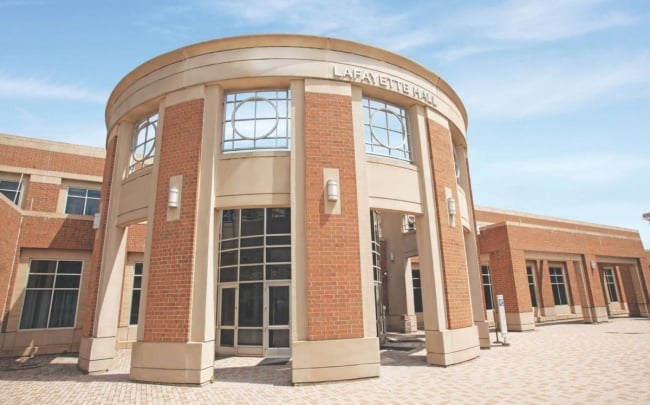You have /5 articles left.
Sign up for a free account or log in.

Students on campus pre-pandemic at Manchester Community College.
Courtesy of Connecticut State Colleges and Universities
Connecticut's public college system is dipping into its reserves to offer free tuition at its community colleges for first-time students this fall.
The plan was already in the works for some time before the pandemic and subsequent recession hit. While those events could make future funding for the program more difficult, officials say it was more important than ever to keep this promise to students.
"I felt very strongly that we had been marketing free community college and community college education," said Mark Ojakian, president of Connecticut State Colleges and Universities. "I felt it was critically important, since we had made a commitment to the citizens of Connecticut to roll out in the fall."
The plan, called the PACT, was supposed to be funded through revenue from a form of gaming called the iLottery. Legislation for the initiative had already passed, but there were delays in starting the iLottery system. Then the COVID-19 pandemic hit.
"So we were left with a piece of legislation that passed and no short-term funding," Ojakian said.
To get the ball rolling, the system is dipping into its reserve funds. It has set aside $3 million to cover the costs of the program for the fall semester, with no clear plans yet as to how it will be funded in the spring and beyond. If a large influx of eligible students applies for the program beyond its anticipated capacity, the system will provide partial grants. That provision is included in the legislation to also address the possibility of revenue shortages from the iLottery, once it's up and running.
The relatively low start-up cost highlights that tuition-free community college is a cheap initiative in most places, said Robert Kelchen, an associate professor of higher education at Seton Hall University.
It could also help the state, not just students, save money, he said. It's generally less costly to educate students at two-year colleges than at four-year colleges, so encouraging students to start at a two-year could be appealing for dismal budgets.
While the system had to tap into its reserves for the upcoming semester, Ojakian said he is optimistic that the program will receive appropriate funding in the spring from the Legislature.
"From all indications of this past legislative session, there were competing proposals in terms of the level of funding, but there was never a question about funding the program," he said. "This is something there’s an incredible amount of interest in. There's a great deal of interest and support for this on both sides of the political aisle."
The program is last dollar, meaning the system will cover the tuition costs that are left after Pell Grants and other aid are applied. About 60 percent of students already pay no tuition to attend Connecticut community colleges because of state and federal aid.
Ojakian hopes that marketing tuition-free college will encourage more students, who may qualify for such aid, to pursue higher education.
"This is not the panacea for improving our equity gap here," he said, adding that the system has other initiatives to address nontuition expenses like transportation and discounted books.
The PACT program will also provide grants of at least $250 to students who are completely supported through Pell Grants.
"But that's clearly not enough," Ojakian said. "While I think the free program is a very good step in the right direction, I think we need to continue to do more to provide those students on full Pell Grants more support as they try to navigate living, working and going to school."
While the intention is good, experts point out that four-year colleges have the largest disparities in equity in Connecticut.
"I would say this plan is a small step in the right direction," said Victoria Jackson, senior policy analyst for higher education at the Education Trust, an advocacy organization focused on equity and student success.
The uncertainty about the program's funding after the first semester could also make low-income students less confident about their ability to enroll for the long term, she said.
The last-dollar approach also won't do much to move the needle on equity, she added.
"It misses the mark on achieving equity," Jackson said. "It misses the mark on making sure that state dollars are going to the students who struggle the most to pay for college."
She hopes that, if the program continues, the state will work to make it stronger and more targeted toward low-income students, as well as to expand it to four-year institutions so that low-income students aren't undermatched. To do that, though, the federal government will have to provide funding help, especially given the recession.
"What they’re doing is appropriate given lack of federal help," she said.
PACT could have a larger impact on four-year public institutions in the state now because of COVID-19, according to Kelchen of Seton Hall. Students who normally would've attended a four-year college right away may choose to attend the free community college to save money, especially as many aspects of residential life will be changed due to COVID-19.
"This could affect the bottom line of some of the regional publics in the state because they’re relying on these students to manage budgets," Kelchen said. "If they lose them for even a semester, that’s a major hit to their bottom line."
There is usually a slight enrollment decrease for four-year colleges the first year that free community college is enacted in states, Ojakian said, but that has tended to correct itself over time. Because Connecticut has a seamless transfer system between the two sectors, Ojakian believes PACT could improve enrollment over all as it would induce more people to apply to college and potentially transfer to a four-year college later on.
Right now, the state is planning for at least a 10 percent decline in enrollment at four-year institutions due to COVID-19, he said, but it's impossible to know exactly what will happen or how PACT will factor into it.
"This is like trying to read tarot cards or something, because you don’t know from one day to the next what’s going to happen," Ojakian said.








